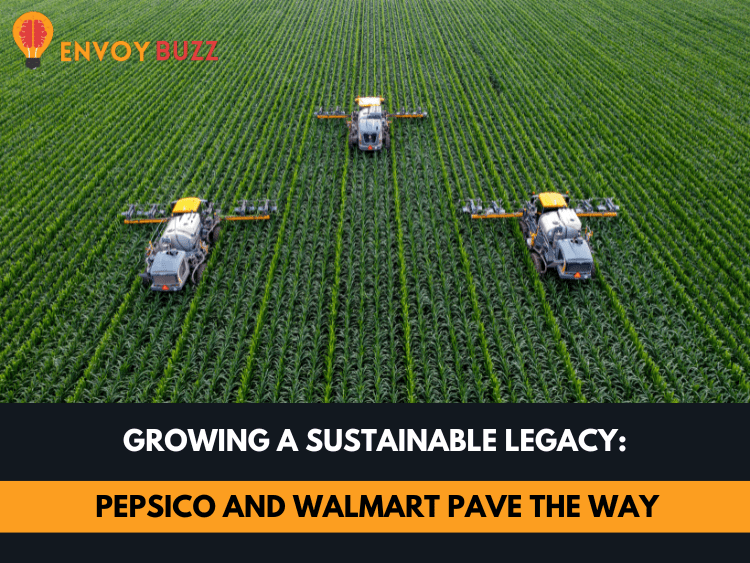Two corporate behemoths, PepsiCo and Walmart, have joined forces to establish a 7 year strategic collaboration aiming at fostering regenerative agriculture in a groundbreaking move towards sustainability and ethical farming practices. The $120 million strategic alliance aims to enable American and Canadian farmers to improve water quality, soil health, and greenhouse gas emissions. This ground-breaking initiative seeks to deliver approximately 4 million metric tons of greenhouse gas (GHG) emission reductions and removals by 2030, which is roughly equivalent to the amount of electricity required to power 778,300 homes for a year. It does this by scaling up financial, agronomic, and social programs. It also intends to hasten the adoption of regenerative farming practices on more than 2 million acres of farmland.
Jeff Huffman, owner and operator of Island Farms LLC in Maxwell, Neb., commented on the voluntary adoption of regenerative agriculture principles, saying, “From my perspective, embracing regenerative agriculture is essential. It’s good for farmers, not only because it’s beneficial to the environment and our food quality, but also for the profitability of our businesses. If you use less fertilizer and you grow a bigger crop, or if you use less water and can still grow the same size of crop, it strengthens your farm in a way that benefits the bottom line and our environment for generations to come.”
The partnership between PepsiCo and Walmart establishes a new standard for social responsibility and environmental sustainability. The corporations are committed to assisting farmers in making the switch to regenerative agriculture by making a $120 million investment over a period of 7 years. More than 2 million acres of farmland are the focus of the effort, which enables farmers to use sustainable techniques that will improve both the general health of their land and the surrounding ecosystem.
According to Jim Andrew, chief sustainability officer at PepsiCo, “we work very hard to earn the trust of the farmer so they understand that we are investing in their legacy, and they can hand their farm down to the next generation, Farmers know their business better than anyone else, and what we hear from them is that for regenerative agriculture to make business sense, three things need to happen. They need economic support, social and cultural support, and agronomic support. This strategic collaboration with Walmart will advance our shared goal to have farmers’ backs as they transform farming in a way that benefits the planet and people. Successful sustainability starts and ends with trust. At PepsiCo”

Jane Ewing, senior vice president for sustainability at Walmart, said “At Walmart, our sustainability strategy is built to make the everyday choice the sustainable choice for our customers, this collaboration with PepsiCo is a great example of how we are prioritizing the expansion of regenerative agricultural practices among farmers across North America so that we can continue to make quality products affordable and accessible for customers. This collaboration aims to help elevate farmer livelihoods, engage them on how to more sustainably manage soil health, increase yields and create a model that others can mimic across other product categories, including encouraging additional investments in regenerative agriculture by other brands.”

PepsiCo and Walmart both place an emphasis on assisting rural communities, enhancing soil and water quality, and reducing carbon emissions. A resilient food system is crucial to PepsiCo’s business as the largest convenient food and beverage company in North America. PepsiCo’s pep+ (PepsiCo Positive) goals include driving the adoption of regenerative agriculture practises across 7 million acres by 2030 – an area roughly the size of PepsiCo’s agricultural footprint – and reducing absolute GHG emissions by more than 40% across its entire value chain by 2030 (against a baseline of 12%).
“This effort is a new model for PepsiCo, marking our first, large-scale strategic collaboration focused on sustainable agriculture with a retail partner,” said Steven Williams, CEO of PepsiCo Foods North America.
For more blogs visit Envoybuzz.

